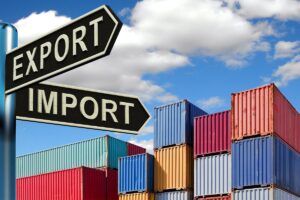
Imports of goods from Ukraine in January-August 2025 amounted to $52.6 billion in monetary terms, which is 16.63% more than in the same period of 2024, but exports decreased by 4.36% to $26.3 billion, according to the State Customs Service (SCS).
“At the same time, taxable imports amounted to $37.8 billion, which is 84% of the total volume of imported goods. The tax burden per 1 kg of taxed imports in January-August 2024 amounted to $0.5/kg, which is 7% more than in the same period of 2023,” the service said in a publication on its Telegram channel on Thursday.
As before, the largest imports to Ukraine came from China ($8.9 billion), Poland ($4.5 billion), and Germany ($3.4 billion).
The largest exports from Ukraine went to Poland ($3.1 billion), Spain ($1.9 billion), and China ($1.9 billion).
Of the total volume of goods imported in January-August 2024, 65% were machinery, equipment, and transport—$15.5 billion (during customs clearance of these goods, UAH 111.4 billion, or 31% of customs payments, was paid to the budget), chemical industry products – $7.8 billion (57.9 billion hryvnia paid to the budget, or 16% of customs payments), fuel and energy products – $6 billion (97.9 billion hryvnia paid to the budget, or 26% of customs payments).
The top three most exported goods from Ukraine were food products ($16 billion), metals and metal products ($2.9 billion), and mineral products ($2.2 billion).
“In the first eight months of 2024, UAH 189.3 million was paid to the budget during customs clearance of exports of goods subject to export duties,” the SSU added.
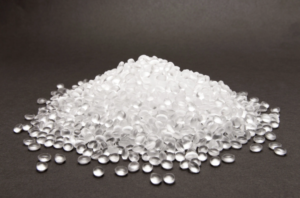
Uzbekistan has abolished excise duties on imports of polyethylene granules and customs duties on primary forms of ethylene and propylene polymers. This is provided for by a decree of the President of Uzbekistan dated August 18 this year to support domestic manufacturers of high value-added ethylene and propylene polymer products.
According to the document, from September 1, 2025, to January 1, 2028, there will be a zero excise tax rate on polyethylene granules (currently 10%) that are not produced in the country and are imported according to an approved list.
Until 2028, import duties on certain primary forms of ethylene and propylene polymers (HS codes 3901 10 900 0, 3901 30, 3901 40, 3902 10 000 0), which currently stand at 5%.
At the same time, the Customs Committee and the Uzbek Agency for Technical Regulation, based on the ex officio principle, must take measures against the import of low-quality and counterfeit flexible packaging — polyethylene and polypropylene films, non-woven materials, bags, big bags, and other products.
customs duty, EXCISE DUTY, IMPORT, polymer raw materials, UZBEKISTAN
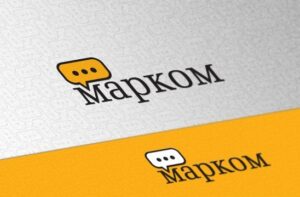
In 2025, Ukrainian farmers will set a record in the history of independent Ukraine for imports of agricultural equipment, which will reach $1.5 billion, according to Mark Valery Barlet, director of the Marketing Communications agency.
“I think there will be a record in the history of independent Ukraine for imports of agricultural equipment. The effect of pent-up demand, which has lasted for the last five years, including 3.5 years of war in Ukraine, will kick in, and during the COVID-19 pandemic, manufacturers did not risk importing combine harvesters. This year, purchases of agricultural machinery will break all records,“ he said during the ”Hlib.ua” conference in Kyiv on Thursday.
According to him, agricultural producers were able to make such a breakthrough in purchases thanks to the long-term development strategy of their enterprises.
“Regardless of the bad weather we had – drought in some places, flooding in others – large companies operate in different regions, develop long-term strategies, and diversify their risks by developing different business areas,” said the marketing agency director.
According to the expert, Ukrainian farmers’ investments in agricultural machinery will reach $1.5 billion in 2025. Barlet estimates that such investments will pay off in at least 10 years.
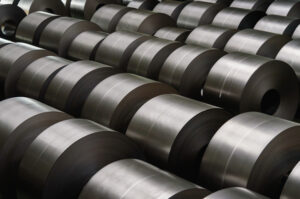
Imports of tin and tin products rose by 52.2% to $2.338 million (in July – $410,000), while exports of tin and tin products in the first seven months of 2025 amounted to $101,000 (July – $16,000) compared to $331,000 in the first seven months of 2024.
Tin is mainly used as a safe, non-toxic, corrosion-resistant coating in its pure form or in alloys with other metals. The main industrial applications of tin are in white tin (tin-plated iron) for the manufacture of food containers, in solders for electronics, in domestic piping, in bearing alloys, and in coatings made of tin and its alloys. The most important alloy of tin is bronze (with copper).
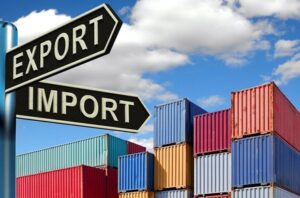
Imports of goods from Ukraine in January-July 2025 amounted to $45.9 billion in monetary terms, which is 17.4% more than in the same period of 2024, while exports grew by 2.7% from $22.6 billion to $23.2 billion, according to the State Customs Service (SCS).
“At the same time, taxable imports amounted to $34.7 billion, which is 76% of the total volume of imported goods. The tax burden per 1 kg of taxable imports in January-July 2025 was $0.52/kg,” according to a publication on the agency’s Telegram channel on Thursday.
Traditionally, the largest importers of goods to Ukraine were China ($9.9 billion), Poland ($4.4 billion), and Germany ($3.7 billion).
The largest exporters from Ukraine were Poland ($2.9 billion), Turkey ($1.9 billion), and Italy ($1.3 billion).
It is noted that in the total volume of goods imported in January-July 2025, 68% were machinery, equipment, and transport – $18 billion (during customs clearance, 112.7 billion hryvnia, or 29% of customs payments, were paid to the budget), chemical industry products – $7.3 billion (57 billion hryvnia, or 15%), fuel and energy – $5.9 billion (105.5 billion hryvnia, or 27%).
The top three most exported goods also remain unchanged: food products ($13 billion), metals and metal products ($2.6 billion), machinery, equipment, and transport ($2.2 billion).
During the seven months of customs clearance of goods subject to export duties, UAH 159.1 million was paid to the budget.

US President Donald Trump has signed an executive order raising tariffs on imports from Canada from 25% to 35% as part of efforts to combat the flow of illegal drugs across the northern border. The new tariffs will take effect on August 1, 2025, according to the White House’s official website.
According to the administration, the decision was made against the backdrop of “Canada’s persistent failure to arrest drug traffickers, seize illegal drugs, or coordinate with U.S. law enforcement agencies.”
“The president’s further actions are necessary and appropriate to protect the lives of Americans, as well as the national security and foreign policy of the United States of America,” the statement said.
The White House recalled that Trump declared a state of emergency under the International Emergency Economic Powers Act (IEEPA) in response to the crisis caused by fentanyl and other illegal drugs.
The preferential treatment for goods covered by the US-Mexico-Canada Agreement (USMCA) remains in place. At the same time, goods that are transshipped to avoid the new tariff will be subject to a separate 40% transshipment duty.
It is noted that in this fiscal year alone, more fentanyl has been seized at the northern border of the United States than in the previous three years combined.